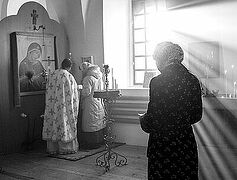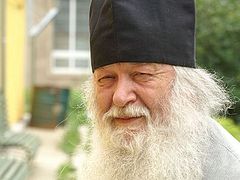With the Sacrament of Baptism, we are cleansed from sins to be one with Christ and the Church. However, habits of our past, misconceptions, bad examples and advice from others, lack of religious knowledge and experience, unwillingness to work on ourselves, etc. lead to the reappearance of our sins. We can compare them to bricks laid in a wall that separates men from God. Sometimes these “bricks” are really tiny, and so we build this wall slowly and unobtrusively. Then we suddenly realize that, because of the wall there, the Divine light no longer penetrates the interior of our soul and it can no longer clothe it with the warmth of its grace. Or, instead of bricks, we erect that wall using blocks or even huge reinforced concrete panels. Zap—and the wall is done! But Confession is the Mystery that smashes this wall of sins; where we retrieve a living connection with God and reunite with the Church, the mystical Body of Christ.
Confession is the Mystery that allows us to retrieve our living relationship with God and reunite with the Church
We can be baptized only once. Repeated “baptisms” made by mistake, oversight, deception, or superstition hold no power. But the Sacrament of Confession is performed many times, giving us the chance to absolve our sins again and again. This is where we face our first questions and perplexities. We all know well that when we repent at confession, we declare our firm intention not to sin anymore. At the same time, every sensible person understands that this confession is not his last. We will confess again and again, many more times, until we die. Does this mean that we stretch the truth well in advance when we come to have a confession? Do we pretend to repent and ostensibly promise to change when we know that it’s impossible? Such thoughts can disturb even the most attentive believers. Those who are unscrupulous and negligent can go entirely rogue—first committing sin and then repenting, then sinning again—soothing their conscience all the while with the promise of future confession, only in order to return to the vicious cycle of sinning, over and over again.
It is necessary for us to digress here and talk about the history of penitential discipline of the Orthodox Church
To resolve this contradiction, we must make a brief detour into the history of the penitential discipline of the Orthodox Church. The oldest form of repentance was the renunciation of paganism at the Sacrament of Baptism. In the early Church, the majority of the baptized were adults who consciously accepted Christianity in the face of severe persecutions, risking at best their reputation in society, and at worst their own lives, since Christianity was outlawed. These people who accepted baptism knew what they were doing, and having once repented of pagan superstitions, fornication, polygamy, witchcraft, and polytheism, they never returned to their former lifestyle. This is how from the first centuries of Christianity, we begin to see this narrative: Once you have repented, you will sin no more. It was more about turning away from paganism, and this, of course, all of the baptized could promise without falling into deceit.
The only serious penitential problem of those times was falling away from the Church out fear of torture. Some hid from persecution, others bought themselves out, while yet others couldn’t withstand torture and offered sacrifice to the gods, but remained Christian at heart. The fate of these people who didn’t become martyrs was actively discussed in antiquity. Who are they now? Are they to be baptized again or accepted on probation? Should they all be accepted, or only those who didn’t offer sacrifices to the gods? Should the ones who ran away and bought themselves out be forgiven? How will all these people stand together with the faithful and recieve Communion from the same Chalice? That is when Confession developed as a public penitence before the community and its primate, bishop or presbyter, as well as epitimia, or penance, exclusion from approaching the Chalice for a time.
But then, Emperor Constantine the Great became favorably disposed toward Christianity and soon made it a state religion. On the one hand, it was good, as the Christians could at last breath freely. But on the other hand, court lackeys, the yesterday’s pagans and today’s neophyte Christians, followed the Emperor to the Church. Many went to accept the new faith not out of religious conviction, but because “it was fashionable” and “it was necessary,” “like everyone else” and “we were told to do so...” Not all, of course. But still, religious life became shallow and the Church observed the ascent of the “classic” sinners we all know very well—modern Christians, or in other words, you and me. From now on, confession had to be done privately, since domestic sins affected not only the conscience of the penitent, but also the personal life and the reputation of other members of the community. It meant that the penitent confessed only before a presbyter as a representative of the congregation, while the latter was very strictly forbidden to drop even a hint of the confession he had heard.
Among the whole variety of sins, the “mortal,” or grave, sins were singled out as the ones that temporarily deny a person from partaking of the Communion and required a “probationary period”—a penance, which involved vigorous prayer, fasting, almsgiving and other spiritual practices. In this respect, repentance of a grave sin and the voluntary execution of a penance for many years testified to the sincerity of the penitent, and assurance that he wouldn’t fall into sin again.
Even in the absence of all worldly temptations, sin does not let go of a person
Perhaps in response to the fact that people’s faith generally grew cool, the number of monks increased manifold. They were the ones who longed to perform spiritual labors, but could no longer find them in the world. Impassable deserts, mountain ranges, and wild forests became alive with bloodless martyrs who voluntarily renounced the worldly pleasures and spenttheir lives in hard labor, fasting and prayer. The first monks led the life of seclusion, when even the so-called cenobitic monasteries were often nothing but lonely huts or caves scattered over a large area. And as it turns out, even in the absence of all worldly temptations. sin still holds man fast. There were no women, money, status clothes, beautiful palaces, or power struggles in the desert. You couldn’t even find someone to quarrel with out there, since you needed since it was a day’s journey to the neighboring cell. But in his thoughts, men continued to contemplate feminine beauty, accumulate wealth, accept the adoration of admirers, and argue with his neighbor. Free from physical sins, the monks concentrated on the struggle with evil thoughts and developed a whole doctrine on the subtleties of human passions and how to deal with them. The monks did happen to fall, if rarely, into grave sins, but most of the brethren had little to repent of during a typical confession, and so a new form of confession was formed—revealing evil thoughts.
Every evening the disciple would tell his elder about the thoughts troubling his soul. and his spiritual father would advise him as to which thoughts he should fight and how to fight them, or what thoughts could be ignored. In this format, confession was no longer about a promise not to sin again; it was quite obvious that the devil would never abandon his temptations. But something was different—there was a determination to fight to the end despite all setbacks. Oftentimes, a monastery confessor was not even ordained, but due to tremendous experience and the power of prayer, he could direct and make his spiritual children perfect not only in deeds and words, but also in thoughts. Without exaggeration, they became like angels as they for many years and practically without sleep or food sang praises to God and sought to behold Him. Hence we have the tradition of “living in obedience”; and this is, as we know, considered to be higher than fasting and prayer. This is not simply cutting off your will according to the principle, “you are the boss—I am the fool.” It means you hand over your life to your confessor, who directly reveals God's will to you, because he himself has already achieved an angelic state. This kind of obedience is higher than fasting and prayer. So, having such elder was a must for every monastery in ancient times.
As the number of monasteries grew, they ended up closer to inhabited areas, and the pious faithful began to come to the monasteries on pilgrimage more frequently, expressing their desire to fast, have confession, receive spiritual guidance, and if possible, to learn the best practices for struggling with passions. It turned out all of a sudden that the methods developed by the monastics also worked well in the world, with some reservations, of course. Returning home, the pilgrims brought to their parish churches the experience of regular revelation of thoughts; because having a confession based on, “I didn’t steal, I didn’t kill, I didn’t cheat on my wife” was no longer sufficient for them and they wanted more depth.
Of course, we have painted this whole rather primitively here, using broad strokes, with a great deal of generalization and conventionality. But in general, it reflects the logic of the formation of the Sacrament of Confession as we know it today.
Now let us return to the point that confused us before. It is derived from the fact that different historical types of Confession became one. Confession as all-round repentance and cardinal change of life, Confession as grieving about your fall into mortal sin, Confession of “everyday” sins, and revelation of thoughts amalgamated in people's consciousness and became a a kind of confessional list. In this list, grave, mortal sins often stand side-by-side, meaning that they treated on a par with minor and absolvable violations of the Statutes. A modern man can repent in the same Confession of fornication, consuming fish on Friday, and mentally offending his neighbor, and feel no difference whatsoever. Yes, they are all sins, but they are absolutely incomparable in the damage they inflict on the soul, the methods of fighting them, and even that same promise not to sin again. Unable to find strength and quickly overcome, say, offence in thought, a man realizes that he no longer fulfills the main condition of Confession mentioned so often in spiritual works and sermons—the determination not to sin anymore. He realizes that not to sin—is impossible. Thus, he continues to fornicate, “sweeping under the rug” the confusion we described earlier, and treating Confession with increasing formality.
Therefore, as we go to Confession, we should clearly realize the gravity of sin and what it is: a betrayal of Christ, or a mild weakness? What do we formally receive as a penance for such a sin—excommunication from Communion for several years, or is it enough to recite a penitential psalm several times? Do we need determination to never sin like that again? Or we will fight with this temptation till our last breath?.. What is important here is not to get it all confused!
To be continued…





